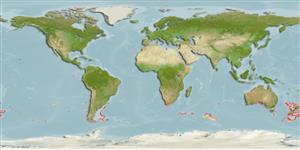>
Gadiformes (Cods) >
Macrouridae (Grenadiers or rattails)
Etymology: Coryphaenoides: Greek, koryphaina = dolphin fish + Suffix oides = similar to (Ref. 45335).
Environment: milieu / climate zone / depth range / distribution range
Ecología
marino batidemersal; no migratorio; rango de profundidad 900 - 1180 m (Ref. 1371), usually 900 - 1050 m (Ref. 1371). Deep-water; 33°S - 58°S, 14°E - 50°W (Ref. 1371)
Indo-Pacific: South Africa, south of Tasmania, New Zealand (including off Campbell and Chatham islands). Southwest Atlantic: off Falkland Islands and Argentina. Southeast Atlantic: off the southeast coast of South America (Ref. 33673).
Tamaño / Peso / Age
Maturity: Lm ? range ? - ? cm
Max length : 37.0 cm TL macho / no sexado; (Ref. 1371)
Short description
Morfología | Morfometría
Espinas dorsales (total): 2; Radios blandos dorsales (total): 134; Espinas anales 0; Radios blandos anales: 140. Barbel rudimentary. The second pectoral ray and the outer pelvic ray are extremely elongated (Ref. 2800). Brown with a rose or rose-violet tint in preserved specimen (Ref. 33673).
A benthic species found on the continental slope (Ref. 75154).
Life cycle and mating behavior
Madurez | Reproducción | Puesta | Huevos | Fecundidad | Larva
Cohen, D.M., T. Inada, T. Iwamoto and N. Scialabba, 1990. FAO species catalogue. Vol. 10. Gadiform fishes of the world (Order Gadiformes). An annotated and illustrated catalogue of cods, hakes, grenadiers and other gadiform fishes known to date. FAO Fish. Synop. 125(10). Rome: FAO. 442 p. (Ref. 1371)
IUCN Red List Status (Ref. 130435)
Threat to humans
Harmless
Human uses
Pesquerías: escaso valor comercial
Más información
Nombres comunesSinónimosMetabolismoDespredadoresEcotoxicologíaReproducciónMadurezPuestaAgregación para la puestaFecundidadHuevosEgg development
Age/SizeCrecimientoLength-weightLength-lengthLength-frequenciesMorfometríaMorfologíaLarvaDinámica larvariaReclutamientoAbundanciaBRUVS
ReferenciasAcuiculturaPerfil de acuiculturaRazasGenéticaElectrophoresesheritabilidadEnfermedadesProcesamientoNutrientsMass conversion
Herramientas
Special reports
Download XML
Fuentes de Internet
Estimates based on models
Preferred temperature (Ref.
123201): 2.5 - 6.1, mean 4.3 °C (based on 91 cells).
Phylogenetic diversity index (Ref.
82804): PD
50 = 0.5000 [Uniqueness, from 0.5 = low to 2.0 = high].
Bayesian length-weight: a=0.00219 (0.00111 - 0.00431), b=3.20 (3.03 - 3.37), in cm total length, based on LWR estimates for this (Sub)family-body shape (Ref.
93245).
Nivel trófico (Ref.
69278): 3.5 ±0.33 se; based on food items.
Resiliencia (Ref.
120179): Bajo, población duplicada en un tiempo mínimo de 4.5-14 años (Preliminary K or Fecundity.).
Fishing Vulnerability (Ref.
59153): Low to moderate vulnerability (27 of 100).
